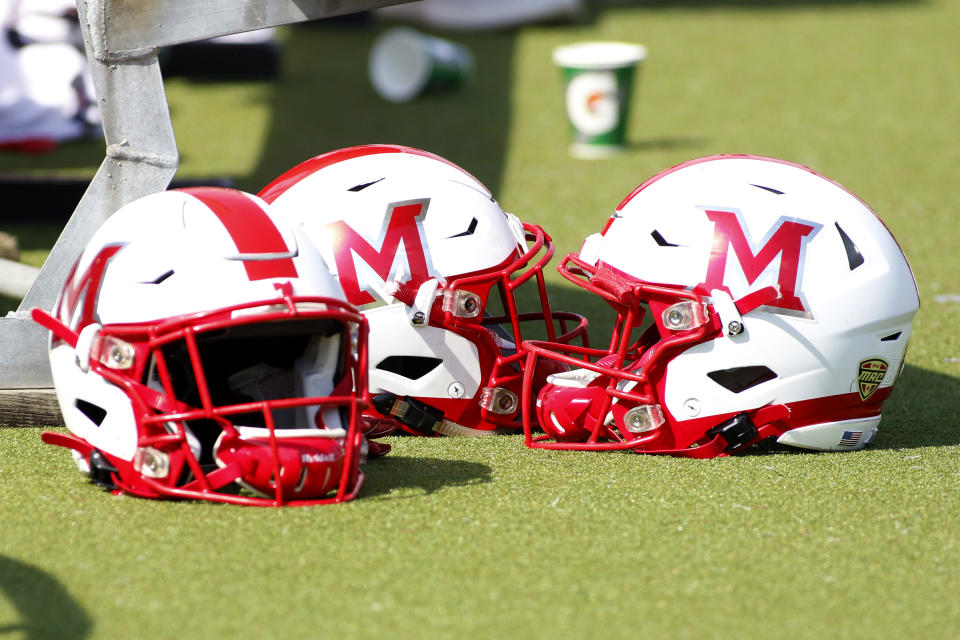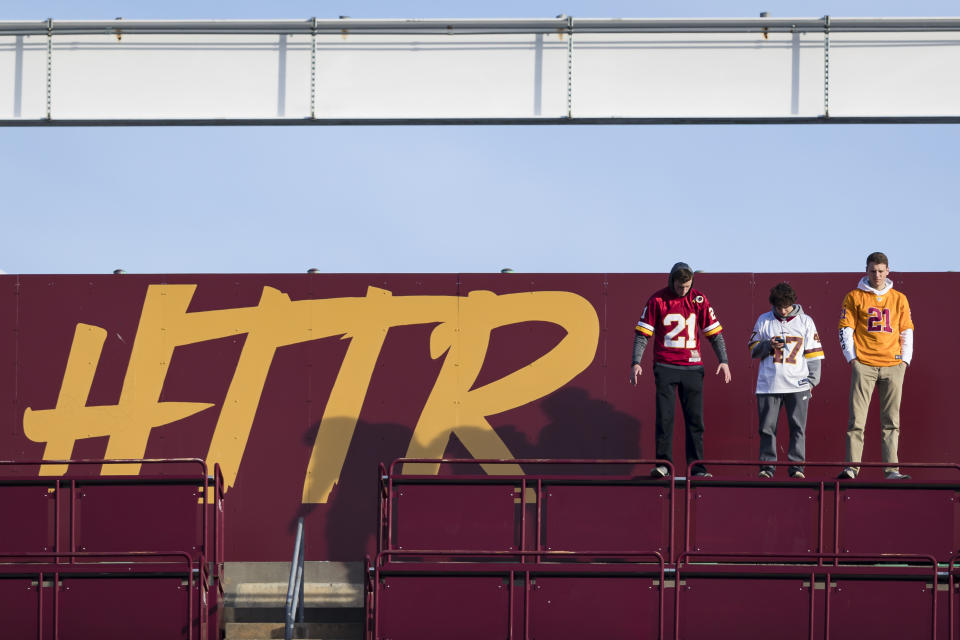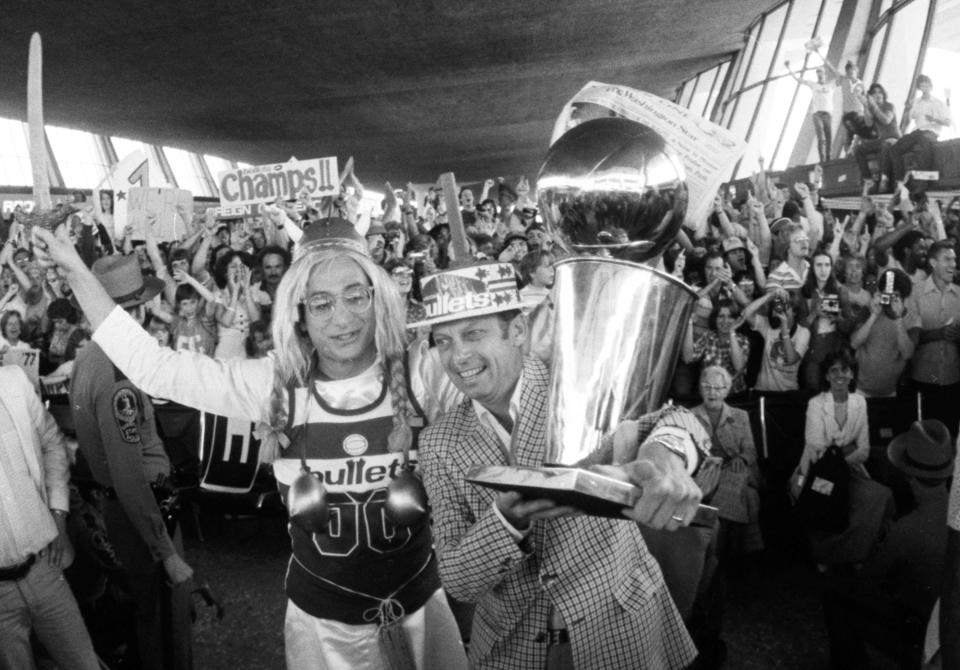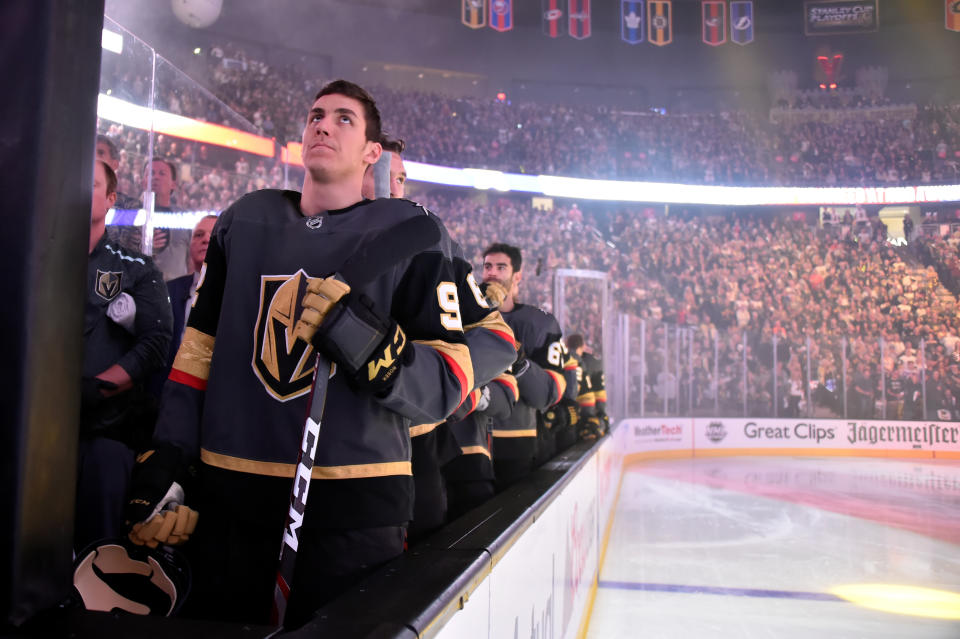Prepare for backlash. Be patient. That's the advice for Dan Snyder from those who led other team name changes
An outcry over the “Redskins” name being offensive. A fan base clinging to outdated traditions. A team begrudgingly accepting change after years of resistance.
This all sounds familiar except the scene is Oxford, Ohio, almost a quarter century ago, not today’s Washington D.C.
On the same 1996 day when James Garland became the new president of Miami University, the school’s namesake tribe sent a formal letter requesting change. Garland honored the Miami tribe’s request against the wishes of many outraged students and alumni.
“What enraged many Miami fans was being told they had to change the name because it was racist, and by implication, they were racist,” Garland told Yahoo Sports. “Miami fans didn’t view the Redskins name as a slur of any kind. They tended to view it as a sign of affection and respect.”
A generation after the Miami Redskins became the Miami RedHawks, the other Redskins are exploring a similar change. Washington’s NFL franchise confirmed Monday morning that it will retire its longtime name and logo and that it will soon choose a new name.

According to the Washington football team’s release, team owner Dan Snyder and coach Ron Rivera “are working closely to develop a new name and design approach.” The team reportedly did not announce a new name on Monday because its preferred choices are entangled in a trademark dispute.
To explore the process of renaming a team and the obstacles Washington must overcome, Yahoo Sports spoke to a handful of sports branding consultants, trademark attorneys and team executives who have been through a name change. They weighed in on how Washington should choose its new name, whether the club should retain its traditional burgundy and gold colors and why it’s not realistic to complete a redesign by September.
1. What’s the typical timetable for a name change?
Rivera told reporters earlier this month that it would be “awesome” if the team changed its name in time for the start of this fall’s NFL season.
It would also clash with the advice of sports branding experts if the team attempted a complete overhaul so rapidly.
Deciding on a new name, obtaining trademarks, designing new logos and jerseys, and replacing all stadium signage is usually an 18-to-24-month process. Sports branding consultants and team executives who have been through the renaming process say Washington might be able to pull it off by the start of the 2021 season but not by September.
“My advice would be to take the time to do this the right way,” said Matt Williams, who in 1997 was the Washington Bullets’ vice president of communications when they became the Wizards.
“I totally understand them wanting to do this now and rip the Band-Aid off, but they probably need to do this in a couple steps.”
2. If Washington can’t completely rebrand by September, how should it handle this year’s NFL season?
The solution sports branding consultants propose is simple.
Ditch the Redskins name and logos. Make no other changes to the franchise’s iconic burgundy and gold jerseys. Be known simply as the Washington football team for one season.
“I would not recommend trying to do a complete redesign on a very fast timeline just to appease the critics, but you have to do something as a stopgap,” said Rodney Richardson, whose Mississippi-based agency has rebranded NBA, NFL and MLB teams. “You become Washington football this year, and you change the name and symbols in question. Then, you start the process of doing the work and doing it right.”

3. What’s typically the first step for a franchise seeking a name change?
Before a design agency helps a franchise select a new name, design a new logo or update its jerseys, a period of discovery is necessary. The agency uses this time to understand a club’s personality and values, to learn how it wants to be perceived and to discover what traits make its fan base and market unique.
Armed with that information, a sports branding consultant can begin to help a team construct a new identity that is indigenous to the market yet appealing league wide.
4. How much say does the public usually have in what the new name is?
Snyder, so far, has made no mention of seeking input from the Washington fans, which means he may be taking a very different approach than the last professional team from the nation’s capital to change its name. The Washington Bullets sought help from their fans in 1995 after team owner Abe Pollin grew frustrated over his franchise’s name being associated with gun violence.
Fans submitted hundreds of thousands of suggestions through a contest run by Boston Market. A seven-person panel that included Pollin and forward Juwan Howard weeded out the obscene, nonsensical and duplicate submissions and pared the list down to 13.
Reaction was almost universally negative to the five names that survived the league’s review of potential trademark concerns. Fans voted a second time via a 1-900 number, with the proceeds from each $1 call going to an anti-violence campaign the team had established. The Wizards won out over the Stallions, Express, Dragons and … gulp … Sea Dogs.

“If I had it to do over, I’d have preferred to go the focus group route, but it was cool involving the public in the decision,” Williams, the then-Bullets’ vice president of communications, said. “At the end of the day, the contest yielded a name that has now grown on people.”
Pollin’s fan-friendly approach may have yielded some bizarre options, but he is hardly the only franchise owner to try to directly engage fans with a name-the-team contest.
Fan polling helped influence Art Modell to name his NFL team the Ravens in 1996 after moving the franchise from Cleveland to Baltimore. The distinctive name references the famous poem by Edgar Allan Poe, who is buried in Baltimore.
A contest also produced the name of the Jacksonville Jaguars in 1991. Jaguars are not native to the state of Florida, but ownership liked the name anyway, selecting it over fellow finalists, the Sharks, Panthers and Stingrays.
5. How involved is the team owner usually in the renaming process?
It varies.
The Portland Trail Blazers once hired Richardson, the sports branding consultant, to update their iconic pinwheel logo. It wasn’t until the project’s final stages that Richardson presented his work to team owner Paul Allen.
“He said, ‘I don’t like it,’ ” Richardson recalled with a laugh. “Where do you go from there? You don’t.”
A few years later, the then-New Orleans Hornets hired Richardson’s agency to rebrand the franchise. Richardson arrived armed with all sorts of ideas for a name change, but new team owner Tom Benson was adamant that his choice was the Pelicans.
“Seriously, a Pelican?” Richardson remembers thinking. “Basketball is a game of beauty, grace and power. The Pelican seemed like a very unathletic, awkward bird to represent a basketball team.”
Richardson changed his mind and conceded the Pelican was an ideal choice after researching what the bird represented to the region. The brown pelican is Louisiana’s state bird and became synonymous with survival and rebirth after being removed from the endangered species list in 2009 while New Orleans was still recovering from Hurricane Katrina.
Of course, hands-on team owners don’t always guarantee a shrewd naming choice.
When the NBA’s new franchise in Charlotte announced its three nickname finalists in May 2003, former NBA creative director Thomas O’Grady hoped club owner Bob Johnson would choose to name his team the Flight. Johnson preferred the Charlotte Bobcats, an ill-fated choice made for the most self-centered reasons.
“The owner paid us to come in as consultants, we gave him the research, we gave him the background, we gave him the logos and he chose his first name for the team,” O’Grady said. “He could have saved three months of my life if he had just said right away, ‘Give me the best Bobcats logo you can give me.’ ”
6. What elements of its old name, color scheme and identity should Washington keep?
Because Washington has nearly a century of brand equity built up in the nation’s capital, its renaming process is unusually difficult. This is not an expansion team that can start fresh with a new name and a new look. The club has to figure out what vestiges of its former identity it can keep or update in order to avoid further alienating longtime fans already upset by the name change.
Washington reportedly has already decided that its new name won’t have any Native American imagery. That’s probably a wise choice given today’s climate and the decades of criticism the franchise has endured because of its former name.
Could Washington try another nickname that begins with Red like Redhawks or Red Wolves? Or maybe just another name that fits with its classic burgundy and gold color scheme? Or what about calling itself the Hogs as an homage to its offensive lines of the 1980s and 1990s?
Of those oft-discussed ideas, sports branding experts say keeping the color scheme is most important for maintaining brand equity.
“I think there’s a lot of affinity for the color of the uniforms,” O’Grady said. “The burgundy and gold is pretty sharp and it’s very unique. If I was consulting, I’d say don’t run away from your colors and for God sakes, don’t go to red, white and blue. Don’t do something that is formulaic and predictable just to mesh in with the Capitals and Wizards.”
7. How concerned should Washington be over potential trademark disputes?
A tiny lakeside college in rural New York endured a sports branding expert’s worst nightmare in 2016.
Legal pressure forced Keuka College to change its new team name less than two years after adopting it.
Keuka’s team name had been the Storm until 2014 when heavy rains led to devastating flooding in the area. Sensing that the Storm was no longer an appropriate name, Keuka administrators chose to rebrand the college as the Wolfpack.
Unhappy that another college was using the same team name, North Carolina State sent Keuka an official request to stop using that nickname, claiming copyright infringement. In February 2016, the Division III school kept its logo but changed its name to the Wolves, a decision that angered school president Jorge L. Díaz-Herrera.
“No one could reasonably confuse Keuka College with N.C. State given the significant differences in our schools — from our size to our division to our colors,” Díaz-Herrera said in a statement at the time. “While NC State may be willing to spend their monetary resources on legal challenges at a time when the very value of higher education is being called into question, Keuka College is not.”
The standoff between Keuka College and N.C. State is one of a handful of recent examples of name changes inciting trademark disputes.
In 2018, the NHL’s Las Vegas expansion franchise reached an agreement with the U.S. Army after a seven-month dispute over the use of the “Golden Knights” name and logo. The Army’s parachute exhibition team for decades had been known as the Golden Knights.

In 2011, a three-judge panel prohibited the University of Southern Mississippi from trademarking the Golden Eagle logo it introduced nearly a decade earlier. The panel ruled that the logo was too similar to the emblem the Iowa Hawkeyes have used for decades.
Pro sports franchises that are considering name changes go to great lengths to avoid situations like these, often hiring attorneys to comb through a list of potential names and identify potential trademark disputes. When a name gets red-flagged, the franchise can scrap it, offer an advance payment to the other party or opt to risk a lawsuit.
Alexandra Roberts, a trademark law professor at the University of New Hampshire, noted that teams with common names like Tigers or Wildcats often coexist peacefully. Issues typically pop up only if the teams compete in the same realm or the logos are too similar.
“The crux of trademark infringement is always going to be the likelihood of consumer confusion,” Roberts said. Unless you can show that, you’re unlikely to be able to make a strong case for infringement. That said, choosing a new mark, you want to be careful. You don’t want to choose something so risky that you have to deal with threats or the actual process of litigation or God forbid going through a second name change.”
8. How much does a name change cost?
Abandoning the Bobcats and going back to the Hornets cost Charlotte’s NBA franchise more than $5 million in 2014, according to a source familiar with the situation. The source estimated that the expenses could be more than double that for an NFL team like Washington.
The biggest cost isn’t developing a new name and logo. That’s peanuts compared to liquidating merchandise, revamping the website and replacing stadium signage, tickets and all other places where the former name and logo exist.
“We went from an orange-based color palette back to our traditional purple and teal,” the source said. “Everything in our building had to be changed. Everything outside our building had to be changed. Everything from a retail standpoint had to be changed. Every digital asset had to be changed.
“We literally had an excel spreadsheet with thousands of items on it. I had somebody in the organization completely focused on making sure we didn’t miss anything.”
Whereas colleges that change their jerseys or logo often make up for any added expenses with merchandise sales, in the NFL, that money is divided evenly among all 32 teams. As a result, Washington would see only a sliver of the proceeds from sales of caps, T-shirts or jerseys.
Of course, don’t shed a tear for Snyder. Whatever the cost of rebranding, it’s hardly prohibitive for a Washington team that Forbes Magazine valued at $3.4 billion last year.
9. Should Washington expect backlash after it changes its name?
Take it from the last D.C. team to change its name. Instant backlash is inevitable when you abandon a name with decades of history.
There was cynicism over Pollin’s suggestion that the Bullets name had anything to do with gun violence. Hardly anyone was initially happy with the five finalists the team announced either, especially the nonsensical Sea Dogs.
Wrote Tony Kornheiser in the Washington Post, “They’re kidding, right? They’ve got to be kidding.”
Added Norman Chad, “You don't go through 500,000 submissions and come up with ‘Washington Sea Dogs’ unless the other 499,999 suggestions were all ‘Washington Gerrymanderers.’ ”
10. What can the Washington Redskins learn from the Miami Redskins?
Ask Garland what advice he has for Snyder as he explores a name change, and the ex-Miami University president has a one-liner locked and loaded.
“He needs a supply of good single-malt scotch,” Garland quipped.
When Garland took a more serious tone, he said the inevitable backlash facing the Washington football team will subside if fans are treated with respect and the team is successful during its transition to a new name. The “Redskins forever, RedHawks never” shirts that popped up in Oxford during the mid-1990s quickly disappeared as Wally Szczerbiak and Ben Roethlisberger led the school to signature basketball and football seasons.
“A lot of the anger subsides very quickly,” Garland said. “We had one trustee walk out, leave the board and say he was never giving another penny to this damn university again, but that turned out to be an empty threat. He came back and supported the team a couple years later.”
To illustrate how challenging a controversial name change can be, Garland revealed one final story. He said Miami’s successful transition landed him on the short list for university president jobs at schools that were also considering abandoning their longtime names or mascots.
“I got this call from Illinois’ search committee saying they would love it if I would just apply now that I knew how to handle this,” Garland said. “I said I very much appreciate the inquiry, but going through this once is enough.”
More from Yahoo Sports:
